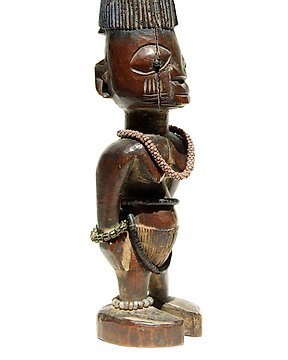
Ibeji - Yoruba - Nigeria
Nro. 82718647

Nro. 82718647

The Yoruba, known for one of the world's highest rates of twinning (45-50 per 1,000 births), revere twins. Shango, the orisha (deity), protects them, and a naming ceremony is held a few months after birth. Due to low birth weight and high infant mortality, many twins don't survive. If a twin dies, parents consult a Babalawo (Ifá diviner) to create an Ere ibeji figure—a wooden carving believed to house the spiritual energy of the deceased twin in the supernatural realm, cared for by a spiritual mother.
Families, especially grieving mothers, find solace in the belief that a spiritual mother cares for the departed child. The Ere ibeji, representing an ideal Yoruba standard of beauty and prime of life, is ritually cared for, adorned with various materials, and carried on the mother's back like a real baby. Despite serving as a receptacle for the spirit, Ere ibeji figures don't resemble children but embody a Yoruba aesthetic ideal.
This ancient male specimen was likely carved in northeastern Nigeria, by the Igbomina people in the state of Kwara. Heavily patinated by usage and age, this uncommon ibeji, intricately detailed and adorned, exudes a strong presence.
Näin ostat Catawikistä
1. Löydä jotain erityistä
2. Tee korkein tarjous
3. Maksa turvallisesti